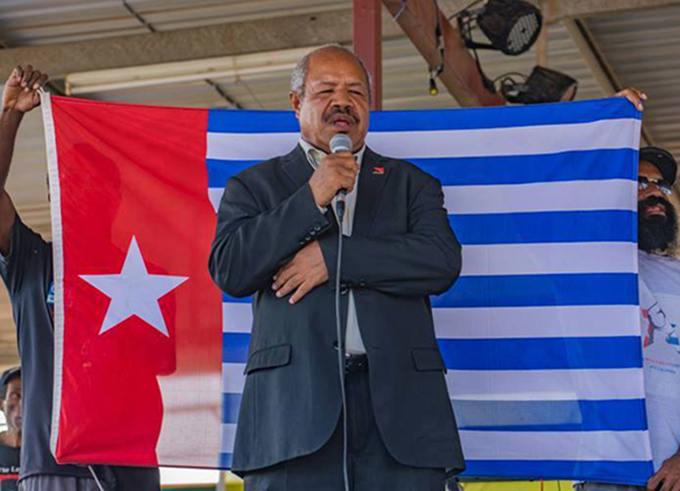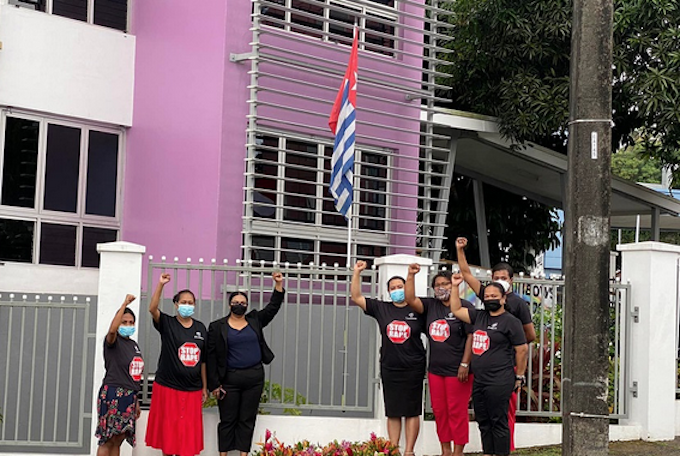Shocking footage has been circulating on social media showing National Armed Forces (TNI) Indonesian military helicopters firing indiscriminately at civilian villages in Suru-Suru District, Yahukimo Regency, Papua. Video: via Café Pacific
SPECIAL REPORT: By Yamin Kogoya
This past week marked 60 years since West Papua declared independence on 1 December 1961.
Around the world, Papuans and solidarity groups commemorated this national day in melancholic spirits — the weight of that fateful day carries courage and pride, but also great suffering and betrayal.
Outraged by 60 years of silence and ignorance, Powes Parkop, the Governor of Papua New Guinea’s capital, strongly condemned the PNG government in Port Moresby last week. He said the government shouldn’t ignore the crisis in the Indonesian-controlled region of New Guinea.
Parkop accused the government of doing little to hold Indonesia accountable for decades of human rights violations in West Papua in a series of questions in Parliament directed at Foreign Minister Soroi Eoe.

“Hiding under a policy of ‘Friends to All, Enemy to None’ might be okay for the rest of the world, but it is total capitulation to Indonesian aggression and illegal occupation,” Parkop said.
“It is more a policy of seeing no evil, speaking no evil and to say no evil against the evils of Indonesia.”
A similar voice also echoed from staff members of the Fiji Women’s Crisis Centre during their West Papua flagraising event at their office in Suva on Wednesday.
Ignorance ‘needs to stop’
Shamima Ali, coordinator and human rights activist from the crisis centre, said Pacific leaders — including Fiji — have been too silent on the issue of West Papua and the ignorance needed to stop.
Ali said that since Indonesia’s occupation of West Papua, gross human rights violations — including enforced disappearances, bombings, rocket attacks, torture, arbitrary detention, beatings, killings, sexual torture, rape, forced birth control, forced abortions, displacement, starvation, and burnings– had sadly become an enforced “way of life” for West Papuans.

SBS also narrated last week’s commemoration of December 1 in Canberra, in which Papuans raised the banned Morning Star flag and expressed the significance of the flag-raising to Papuans.
As a mark of remembrance, flags were raised all across the globe from Oxford — the refugee home of Benny Wenda, the West Papua independence icon — to Holland, homeland of many descendants of exiled Papuan independence leaders who left the island in protest against Indonesia’s illegal annexation in 1960.
Celebrating Papuans’ national day in West Papua or anywhere in Indonesia is not safe.
Amnesty International Indonesia reported last Friday that police arrested and charged eight Papuan students for peacefully expressing their political opinions on December 1 — Papuans’ Independence Day.
The report also stated that Papuans frequently face detention and charges for peacefully expressing their political views. But counter-protesters often assault Papuans under police watch with no repercussions.
Eight arrested in Jayapura
At least eight people were arrested in Jayapura, Papua, and 19 were arrested in Merauke, Papua, for displaying the Morning Star flag.
In Ambon and Bali, 19 people were injured by police beatings, and 13 people were injured when protesters were physically attacked by counter-protesters who used racist language, reports Amnesty International Indonesia.
In West Papua, the Indonesian police are also reported to have investigated eight young Papuans involved in raising the Morning Star flag in front of the Cenderawasih Sport Stadium, known as GOR in Jayapura Papua, according to the public relations Chief of Papua Police, Ahmad Musthofa Kamal.
Across West Papua, the Morning Star flag has been raised in six districts: Star Mountains, Intan Jaya, Puncak, Central Mamberamo, Paniai, and Jayapura City.
Unfortunately, Papuans are hunted like wild animals on this day as Jakarta continues to force them to become a part of Indonesia’s national narrative. The stories of which, for the past 60 years, have been nothing but nightmares filled with mass torture, death, and total erasure.
Amid all the celebrations, protests, and arrests happening across the globe on this national day, shocking footage emerged of yet another aerial attack in the Star Mountain region.
In the last few days, shocking footage has been circulating on social media showing National Armed Forces (TNI) Indonesian military helicopters firing indiscriminately at civilian villages in Suru-Suru District, Yahukimo Regency, Papua.
According to reports, this is the result of a shooting incident between the West Papua National Liberation Army (TPNPB) and the TNI in which a TNI member was killed, and another was wounded.
Soldier flown to Aceh
Serda Putra Rahaldi was one of those killed in the incident. He was flown to Aceh via Jakarta.
Praka Suheri, another TNI soldier wounded in the incident, has also been evacuated to Timika Regional General Hospital for treatment.
It is difficult to know the exact circumstances leading to the death of a soldier, but Brigadier General TNI Izak Pangemanan, Commander of Military Resort 172/PWY, says two soldiers were drinking water in a shelter located only 15 meters from the post when the shooting took place, Antara reported on Saturday, December 4, 2021.
Since November 20, five TNI soldiers have been wounded, including Sergeant Ari Baskoro and Serda Putra Rahaldi, who died in Suru-suru, Antara reported on Saturday, December 4, 2021.
The armed conflicts remain tense between the TPNPB and the TNI in seven regencies in the territory of West Papua, namely: Yahukimo District, Intan Jaya Regency, Star Mountains Regency, Nduga District, Peak District, and Maybrat-Sorong Regency.
This seemingly low-level, yet hidden conflict between the Indonesian state security forces and the TPNPB continues, if not worsens, and the world has largely turned a blind eye to it.
The Papuan church leaders stated in local media, Jubi, on Thursday November 25, that a massive military build-up and conflict between Indonesian security forces and TPNPB had resulted in displacing more than 60,000 Papuan civilians.
‘More than 60,000 displaced’
“More than 60,000 people have been displaced. Many children and mothers have been victims and died while in the evacuation camps,” said the chair of the Synod of West Papua Baptist Churches Reverend Socrates Sofyan Yoman.
Jakarta seems to have lost its ability to see the value of noble words inscribed in its constitution for the betterment of humanity and the nation. In essence, what is written, what they say, and what they practise all contradict one another – and therein lies the essence of the human tragedy.
On December 1, 1961, the sacred Papuan state was seized with guns, lies and propaganda.
On May 1, 1963, Indonesia came to West Papua with guns.
In 1969, Jakarta forced Papuan elders to accept Indonesia during a fraud referendum at gunpoint. In the 1970s, Indonesia used guns and bombs to massacre Papuan highland villagers.
And after 60 years, Jakarta is still choosing guns and bombs as their preferred means to eradicate Papuans.
Sixty years on, the making of the current state of West Papua with guns and bombs is difficult to forget. Although West Papua lacks one key characteristic that East Timor had that brought international attention to their ardent independence war.
Morning Star flag – always flying
Nevertheless, as demonstrated around the world last week on December 1, their banned Morning Star flag seemed to always be flying in some corner of the world.
As long as Papuans fly the Morning Star flag, their plight will challenge the human heart that cries out for freedom that binds us all together, despite our differences.
As Indonesia’s state violence intensifies, Indonesians are likely to sympathise more with Papuans’ plight for justice and freedom.
At some point, the government of Indonesia must choose whether to continue to ignore Papuans and use guns and bombs to crush them or to recognise them with a new perspective.
Yamin Kogoya is a West Papuan academic who has a Master of Applied Anthropology and Participatory Development from the Australian National University and who contributes to Asia Pacific Report. From the Lani tribe in the Papuan Highlands, he is currently living in Brisbane, Queensland, Australia.
This content originally appeared on Asia Pacific Report and was authored by APR editor.
APR editor | Radio Free (2021-12-06T01:12:26+00:00) Yamin Kogoya: 60 years ago, Indonesia invaded West Papua with guns. 60 years later, they’re still ruling with guns. Retrieved from https://www.radiofree.org/2021/12/06/yamin-kogoya-60-years-ago-indonesia-invaded-west-papua-with-guns-60-years-later-theyre-still-ruling-with-guns/
Please log in to upload a file.
There are no updates yet.
Click the Upload button above to add an update.